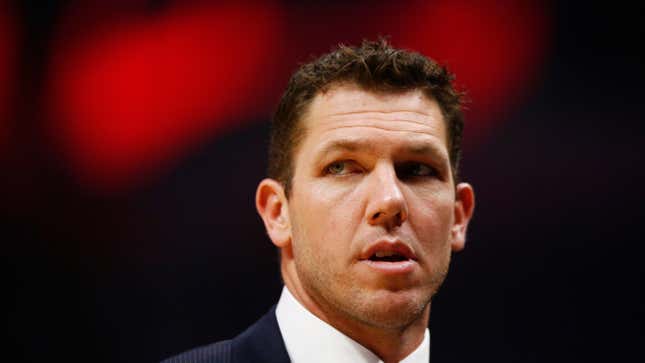
It’s Friday afternoon, that time when every American sports league dumps the news it would rather you not see. Today, that meant the NBA announced the results of the league’s investigation into sexual assault allegations against Sacramento Kings coach Luke Walton.
Walton, the son of beloved basketball legend Bill Walton, was sued in April by sports reporter Kelli Tennant. In her lawsuit, filed in Los Angeles Superior Court, Tennant said that Walton sexually assaulted her in his hotel room in 2014. When the lawsuit was filed, Walton’s lawyer, Mark Baute, called Tennant “an opportunist, not a victim” and said “her claim is not credible.”
Today, the NBA announced that it—a sports league that’s qualified to do nothing except oversee basketball games—had determined “there was not a sufficient basis to support the allegations made against Coach Walton.”
The statement leaves out a lot of really important information, but the biggest piece is this: Tennant’s lawsuit remains ongoing.
The last document filed in that case was by Walton last month, a document in which he denies Tennant’s claims, according to the court docket online. There’s no indication of the lawsuit being dismissed. Perhaps the NBA leadership is privy to knowledge that the case will be settled soon or tossed from court. But it’s equally as possible that the lawsuit pushes ahead and evidence comes out casting doubt on Walton’s version of events, embarrassing the league, which is what happened in the Derrick Rose civil lawsuit. (Rose’s defense lawyer from that case is the same one now hired by Walton.)
The NBA left that big detail out of the statement because this statement has one function: Telling basketball fans that, whatever happens, it’s not the NBA’s fault. It’s Tennant’s. Because Tennant did not talk to the NBA for its investigation, but Walton did, and so he got a nice reward for doing so—a clean slate as far as the association is concerned.
Expecting a private person—who is not your employee, and who remains involved in an ongoing legal action—to participate in your company’s internal investigation of the employee who is being sued is ridiculous. Tennant owes the NBA nothing, and her priority is and should be her lawsuit. The NBA could have waited for the lawsuit to be resolved to conclude its own investigation, but its leaders almost certainly wanted to wrap this up before the start of training camps.
As a general rule, sports leagues shouldn’t be weighing in as judges and juries on sexual assault because, not only are their leaders vastly unqualified to conduct these investigations or issue penalties, but their actions can cause more harm than good. Why bother coming forward when one of the most powerful sports leagues in the world is going to take the side of the accused and then say, Well, we had to clear him because you didn’t play along in our cosplay judicial process.
It’s no coincidence that the NFL used similar language when explaining that league’s one-game suspension of then-Giants kicker Josh Brown, saying the problem was that Brown’s estranged wife and local law enforcement wouldn’t help them out and that they were “limited in our ability to investigate” the reports of domestic violence. Similar language came up, again, when bans were overturned on a taekwondo coach and a taekwondo athlete accused of sexual abuse because the women said they didn’t want to testify when they were also slated for depositions in a massive civil lawsuit. The problem, somehow, is never the system. It’s always the choices made by victims.
The rest of the NBA statement is meaningless. It says more than 20 people were interviewed but it doesn’t tell us who they were, which means those people could be anybody from friends of Tennant to friends of Walton. “Relevant materials were reviewed,” which tells us nothing. If this were a real court of law—the strategy Tennant continues to pursue—there would be answers to these questions, like names of people called to testify and documents filed with the court. But this is not a court of law, it’s a sports league pretending to be one.
The NBA left itself a trapdoor, saying the case is closed “unless new evidence becomes available.” So Walton is back, unless something embarrassing comes out. Which is to say that this, like every other sports league investigation, is a piece of public relations masquerading as something of substance. It’s another blanket under which fans can tweet “bitches lyin” and “the bitch lied.” Fans were going to tweet that anyway, but now they have an NBA-certified investigation to prove them right. Because a PR campaign, which this is, functions like a crystal ball. It shows you whatever you want to see.